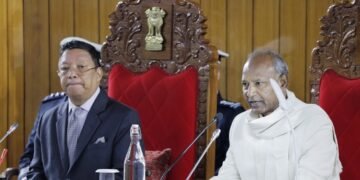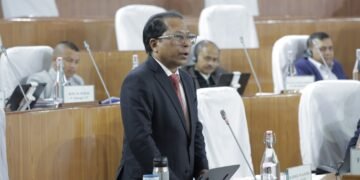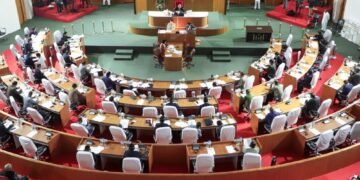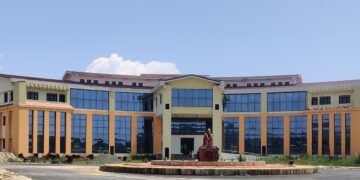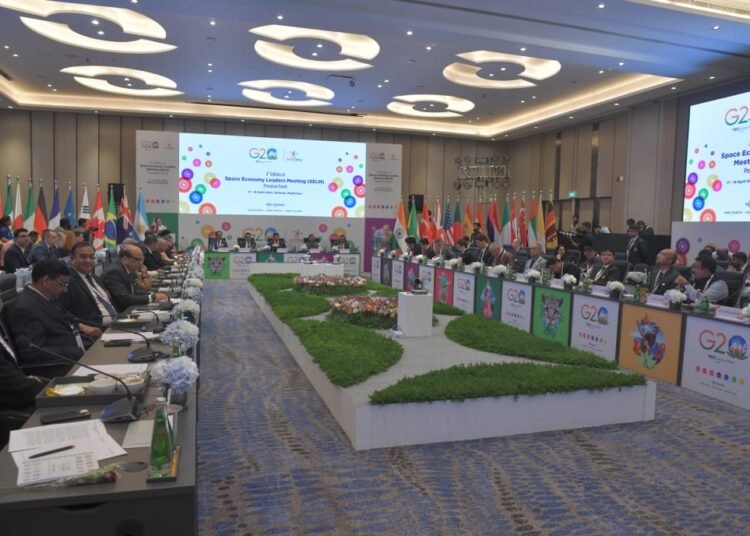Under India’s G20 Presidency, the precursor meeting of the G20 Space Economy Leaders Meeting (SELM) commenced here today. The focus of the two-day event is to showcase all the capabilities of ISRO and the Department of Space and to collaborate in future science missions.
A hurriedly spruced up Shillong welcomed the delegates, with certain roads relaid and painted, streets cleaned, banners and hoardings festooned around the city and with a greater presence of police and Home Guards. Even Shillong’s notoriously bad traffic appeared to be cooperative, though the load-shedding continued regardless.
Twenty-eight delegates from the G20 and guest countries attended the meeting – Argentina, Australia, France, South Korea, Mexico, Türkiye, USA, Oman, Bhutan, Sri Lanka, China, Russia, Netherlands, Germany, Indonesia and the UK. Prominent international and national experts also attended the discussion.
The inaugural programme was attended by Chief Minister Conrad K Sangma, Union Minister of State (Finance) Pankaj Chaudhury, Union Minister of State Science & Tech Jitendra Singh (online), ‘G20 Sherpa’ Amitabh Kant, Secretary of the Department of Space Somanath S, Chairman of IN-SPACe Pawan Kumar Goenka and other dignitaries.
Chaudhury said that the Indian economy is growing at a faster rate and the major contribution to this growth is from the ‘new space’ segment. Stressing on the need to conduct the space activities in a responsible manner he said that efforts are being taken to promote new space for further fuelling the space economy. As all the G20 members have established space agencies and industries, the country should also look forward to possible alliances, he said.
Chaudhury also said that space-based technologies are recognised as one of the key contributors for growth and prosperity. These include satellite-based Earth observation, satellite communications and navigation, which have positive impacts on agriculture, disaster management, transportation, health and in addressing climate change issues.
Singh, while virtually addressing the inaugural session, said that significant progress has been made as far as India’s space sector is concerned and has penetrated all walks of life. “As a result of this, there is a huge demand for space-based services which have huge commercial potential,” he added.
Sangma, meanwhile, said that in recent times India has seen a large number of reforms and while the country as a whole has moved forward, the North East had not seen the kind of growth economically but has recently become a part of the economic growth and success of the country.
Kant said that India firmly believes that the country, as a global community, must think and act as one in this journey to and through the final frontier: space. He referred to the historical event and the thought shared by Wing Commander Rakesh Sharma, the first Indian citizen who went to space – “Anyone who goes to space tried to look at his own country first, but soon it appears that there is no boundary between the countries and the entire world is one family where our destinies are integrated.” He appealed to the delegates and participants to take a moment to consider how this thought, shared decades ago, is reflected in the theme of India’s G20 Presidency, “Vasudhaiva Kutumbakam” or “One Earth. One Family. One Future.”
During the technical deliberations in today’s programme, the delegates discussed the perspectives of the respective G20 countries on space economy and the present state of space economy in the respective countries. Efforts by the respective governments to promote space economy, including the New Space and the challenges faced were also discussed. Following this, a session on policy perspectives of space economy was also held, wherein there were curated talks on specific aspects of space economy by think tanks and experts.
Startups in the space economy sector participated in the precursor event and showcased their products. Some of them are Alpha Design, Satsure, Oneweb, Data Pattern, Centum Azista Aerospace, Caliche, L&T, Skyserve, Ananth Technologies, Agnikul, Digantara, Pixxel and Dhuruva Space.



